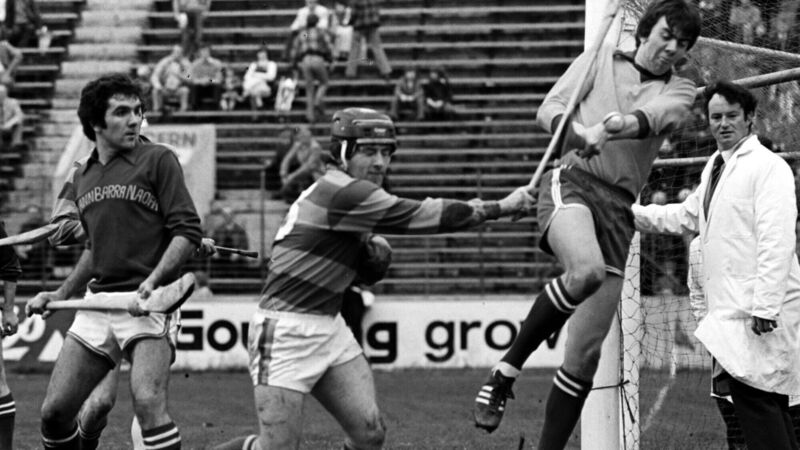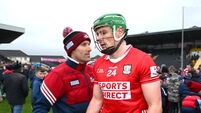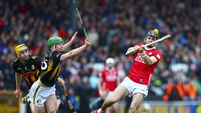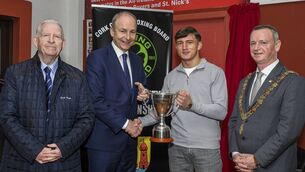Cork tried hurling and football groups stages at club level from 1978 to '80

The 1979 Cork SHC final between Blackrock and St Finbarr's - the second of three years where a group system was used.
TONIGHT sees the draws take place for the 2021 county championships.
Despite the compacted timeframe and interrupted preparations, last year’s championships were considered to be a great success as the new group format captured the imagination while the decoupling of the county and club seasons meant a clarity to the calendar.
While the decision to introduce a round-robin phase was a revolutionary one, it should be noted that it was not totally unknown for Cork to deviate from the knockout system.
In the 1970s, Cork were on top of the tree, winning an All-Ireland three-in-a-row from 1976-78 inclusive, while the All-Ireland club was shared between Blackrock, Glen Rovers and St Finbarr’s from 1971-81.
Cork County Board set up a committee to establish whether or not something could be done and, ahead of the county convention in February 1978, it was reported that “the committee which brought in the recommendations found that a ‘major imbalance’ exists in the standard of teams competing in the senior championships, particularly hurling.
“The committee examined a number of other proposals, one relating to the concept of the group team, i.e. an existing senior club having the assistance of players lower-grade clubs in the neighbourhood or a group of lower-grade clubs forming a senior team.”
Instead, the solution was a three-tier championship at senior hurling and football level – the five highest-ranked sides playing a round-robin with the top two reaching the semi-finals and third place going into the quarter-finals; the next five playing a round-robin where the top two would reach the quarters; and a divisional competition with one team going forward for the last quarter-final spot.
The proposals were passed convincingly at convention though they were not without some opposition. A seeded draw had been in place and while there had been calls to revert to an open draw, county secretary Frank Murphy said it would be a disaster to return to the open-draw system because, since the seeded draws were introduced, financial returns from the concluding games of the championship had grown enormously. Under the new system, he said, weaker teams would benefit and there was nothing in the format which would affect the top teams unduly.
Blackrock had a 100 percent record in the group phase, with Glen Rovers finishing second and that pair would meet again in the final. St Finbarr’s finished third but came through their quarter-final against Sarsfields, the winners of the second section, while Muskerry were the fourth side in the semi-finals.
In both 1979 and 1980, Midleton proved themselves to be the best of the rest and they would eventually break through the glass ceiling in 1983.
With more teams in the senior football, there were four different sections. Nemo Rangers became the first club to win a county title after losing a game as they overcame an early defeat to St Finbarr’s to come back and win the 1978 SFC, beating St Michael’s in the final.
A year later, intermediate champions Castlehaven emerged from the third section to reach the decider, losing to the Barrs, while the Togher outfit retained the title in 1980, beating UCC in the final.
By that stage, though, the experiment had run its course and the convention held in January 1981 saw a return to the knockout format. In hurling, the four semi-finalists would be seeded in separate quarters of the draw, while the SFC would be split into two sections, city and rural/divisions, ensuring a city/county final meeting.
A key factor in the rejection of the group system was the lack of championship atmosphere. GAA past president Con Murphy said that it was obvious that the championship attitude had died, what was needed was a combination of all-out performance and public patronage. However, Sarsfields’ Denis Hurley said that the groups had benefited teams like his club, Midleton and Erin’s Own in being involved up until August.
Ultimately, revenue was a factor – Frank Murphy reminded convention that the senior championships essentially subsidised the rest. Tim Downey of Clonakilty said that two SFC played there had generated £1,200 whereas the Carbery JAFC final had brought in £1,800.
The knockout returned and it would be nearly four decades before groups were tried again.







 App?
App?







